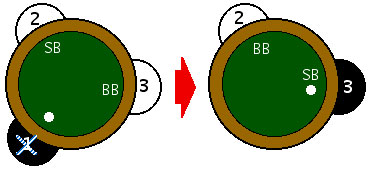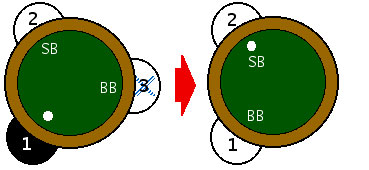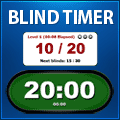|
|
Button HelpWhen the small blind or big blind is eliminated from a poker tournament, the blinds must be re-positioned to account for the eliminated player. The rules pertaining to this event are referred to as the Dead Button rule or the Moving Button rule. You must decide which one of these two rules you will use before you begin playing your poker tournament. Most tournaments use the Dead Button rule. Be warned that using the Moving Button rule can create some unusual scenarios ... so be well prepared. Dead Button RuleThe big blind is posted by the player due for it, and the small blind and button are positioned accordingly, even if this means the small blind or the button is placed in front of an empty seat, giving the same player the privilege of last action on consecutive hands. Robert's Rules of Poker - Section 4.2b Small blind is eliminatedIf the small blind is eliminated and is not replaced by a player from another table, the button moves to the now empty seat (the seat vacated by the eliminated small blind). The player who was the big blind now posts the small blind and the player to his left posts the big blind. Since the button is now located at an empty seat, the player who was the button will, in effect, be the button once again.
Big blind is eliminatedIf the big blind is eliminated and is not replaced by a player from another table, the button moves to the player who was the small blind and the player to the left of the eliminated big blind posts the big blind. There is no small blind for that hand. On the following hand, the button moves to the now empty seat (the seat vacated by the eliminated big blind player) and the two players to the left post the normal blinds. Since the button is now located at an empty seat, the player who was the original small blind will, in effect, be the button once again.
Both blinds are eliminatedIf both blinds are eliminated and not replaced by players from another table, the same player will be the button three hands in a row. The button moves to the empty seat (the seat vacated by the eliminated small blind player) and the player to the left of the eliminated big blind posts the big blind. There is no small blind for that hand. On the following hand, the button moves to the next empty seat (the seat vacated by the eliminated big blind player) and the two players to the left post the normal blinds. The button and blinds are placed normally for the following hand.
Moving Button RuleThe button always moves forward to the next player and the blinds adjust accordingly. There may be more than one big blind. Robert's Rules of Poker - Section 4.2a Do not use the Moving Button rule unless you know what you are doing. I won't even explain it other than to provide these two examples. To understand the Moving Button rule, keep in mind that the button must move forward and players must post their normal blinds as if no player had busted out. The reason for having multiple big blinds is to keep the (big blind followed by small blind) pattern.
Heads-up PlayWho is the button when heads-up?When there are only two players remaining in a poker tournament - the small blind is the button and acts first before the flop and last after the flop. The player who does not have the button is dealt the first playing card. Three players remain and one is eliminated ... who gets the button?Many players get confused when trying to figure out what happens to the button and blinds when you go down from three players to two players at the end of your poker tournament. Which one of the two remaining players is the button, and who is the big blind? The important thing to remember is that no player should be forced to pay two big blinds in a row, especially towards the end of your tournament when the blinds are extremely large. For this reason, you should forget about who becomes the next button, and instead determine who becomes the next big blind. Once you have established who the next big blind should be ... the other player is the small blind (and the button). In a poker tournament, when going down from three players to two players, the next big blind will be the first non-eliminated player clockwise from the big blind in the previous hand. The other player will be the small blind (and button). Dealer is eliminatedIf the dealer is eliminated, the small blind becomes the big blind, and the big blind becomes the small blind and button. Rationale - Player3 just paid the big blind and should not be the big blind two hands in a row ... so Player2 must be the big blind. Since Player2 is the big blind ... Player3 must be the small blind and button.
Small blind is eliminatedIf the small blind is eliminated, the dealer becomes the big blind, and the big blind becomes the small blind and button. Rationale - Player3 just paid the big blind and should not be the big blind two hands in a row ... so Player1 must be the big blind. Since Player 1 is the big blind ... Player3 must be the small blind and button.
Big blind is eliminatedIf the big blind is eliminated, the dealer becomes the big blind and the small blind is once again the small blind (and button). Rationale - Player3 just paid the big blind and Player1 would normally have been the next big blind ... so Player1 should be the big blind. Since Player1 is the big blind ... Player2 must be the small blind and button.
|
Online Poker Guide
Hand Converter
Holdem strategy
Freeroll tournaments
Poker calculator
Online poker
Poker rooms
> poker pokeren
> iDeal poker
> online casino
> iDeal casino
> casino casinos
> casino bonus
Get Bonus code Titan Poker, and full tilt poker referral code or max bonus to the full tilt referral code. Best ultimate bet referral code sign up bonus doyles room promo code or poker host bonus code































